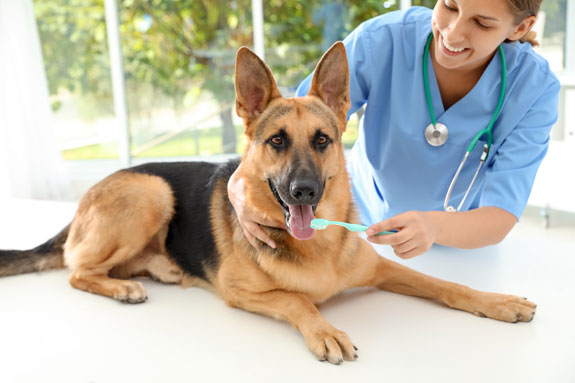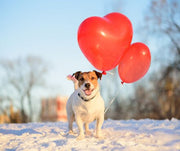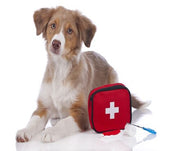Bad Dog Breath: Causes & Solutions

You've probably experienced several instances where you were in the middle of a cuddle session with your dog, only to be stunned by their bad, sometimes offensive, breath. We love our pups, but sometimes getting up close and personal has its drawbacks. Not only is it unsavory for pet parents, but habitually bad breath could be a sign of oral hygiene issues, something you'd definitely want to catch sooner rather than later. Although there are some quick fixes that you can give your dog, like dog breath spray or mints, if you've found this to be a continuous problem, then it's best to do a little research into possible causes and what you can do to treat and prevent it. If necessary, seeing a veterinarian first thing can be very beneficial.
This article will briefly explain possible causes of your dog's bad breath and solutions to keep your nose and your dog happy.
CAUSES
Oral Hygiene & Periodontal Disease: These are the most common causes of bad breath in dogs. Like humans, plaque and tartar build-up can lead to bacterial development, which may cause bad breath. If your dog does not regularly chew on treats and you don't have the time to regularly brush his teeth or have his teeth cleaned, plaque build-up may have already happened. Over time, poor hygiene can then lead to periodontal disease. Aside from various effects, bad breath is one of the most noticeable signs.
Various Diseases: Apart from periodontal disease, bad breath can also be an indicator of canine diabetes, liver, or kidney disease. If your dog has diabetes, his bad breath may have a tinge of a sweet or fruity smell to it. Kidney disease, on the other hand, may result if your dog's breath smells like urine. Though some does do eat poop, your dog's breath smelling like pee doesn't necessarily mean they drank some. Kidney disease is serious and could be a symptom of a larger medical problem and warrants a visit to your veterinarian. Lastly, if your dog's breath smells extremely foul and he also exhibits other symptoms, your can could have liver disease. A visit to the vet is certainly necessary.
Unpleasant Dietary Habits: If left unattended, dogs often resort to gross habits. These habits can, as you already know, translate to bad breath. For example, if your dog regularly dives into the trash bin, or he somehow has access to decomposing trash or worse, animal remains, bad breath can be expected. In this situation, bad breath is due to unsupervised snacking or messing around.
If you also have a cat in the house, make sure to keep the litter box as clean as possible, as some dogs seem to love cat poop. If you're having trouble keeping the dog out of your regular litter pan, consider a Top Entry Litter Box. These types of litter boxes are designed specifically to keep dog's out. Aside from cat poop, some dogs even eat their own or other dogs' poop. While it's nasty, some dogs eat dog poop because they are missing essential vitamins from their diet. Be sure to look at your dog's food to make sure you're giving him the best food possible and remember to supervise your dog accordingly.
TREATMENT & PREVENTION OF BAD BREATH IN DOGS

Once you understand the underlying issues behind your dog's bad breath, it's finally time to try and nip it in the bud. Curing your dog's bad breath depends on the cause, but there are a few treatment options that apply to most of these cases.
If the cause is either tartar, plaque, or periodontal disease, then the best thing you can do is schedule a visit with your veterinarian for a dental cleaning. Your vet can examine your dog's mouth and a diagnosis may be necessary to determine proper treatment as well as prevent other complications. The simplest mode of prevention is to brush your dog's teeth regularly. There are specific oral health products on the market that are optional for your dog's oral hygiene, but take not that canine toothpaste is necessary when tooth brushing. Human toothpaste is poisonous to dogs, so DO NOT use it. Regular brushing reduces plaque and promotes oral hygiene. If your dog doesn't particularly enjoy this activity, be patient and give him time. Most dogs will learn to settle with a little training and rewards.
When it comes to unsupervised eating, securing your trash at home and limiting your dog's access outside where there are unpleasant finds will solve the issue. Instead of offering your dog multiple "snacks", opt for chew toys. Not only does chewing prevent tartar and plaque build-up, but it also relieves boredom and keeps your dog busy and entertained. There are a bunch of chew toy options made from different materials and available in multiple sizes and shapes.
Lastly, pursuing a change in lifestyle can also prevent bad dog breath and promote healthier habits. Feeding your dog a healthy and balanced diet, playing with them to promote exercising, and taking them to the vet for regular check-ups are all great ways to keep your dog happy and healthy.
We hope these tips help, and that you have plenty of snuggle sessions to come, sans unpleasant breath!
Previous article

Next article

Related posts
View all-

National K9 Veterans Day: Why and How to Celebrate
National K9 Veterans Day is celebrated every year on March 13th. This year its on Saturday March 13th, 2024. This day was established to recognize and celebrate the contributions that Military Working Dogs.
Read Article -

Puppy Training Tips
Training your pup from day one helps set a solid foundation for good behavior and a well-adjusted adult dog. Puppies thrive on structure, and a predictable routine makes learning easier.
Read Article -

Spring Cleaning Tips for Pet Parents
Say goodbye to the winter germs and hello to all the new spring smells! The beginning of spring is the perfect time to clean your house. For pet owners, this can mean more in-depth cleaning in areas other people don't have to worry about. We will give you some helpful tips and tricks so that cleaning up after your pet seems a little less daunting. Read Article



